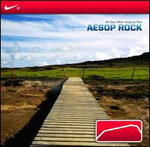
Aesop Rock
All Day EP
(Commisioned by Nike for an iTunes exclusive; 2007)
By Clayton Purdom | 13 April 2007
This year has been a rough one on the English language. From instrumental production showpieces like Pantha du Prince and Stars of the Lid to Panda Bear’s unintelligible bleating and Boris’ tacked-on yelps, “singing” is out this season. Even El-P’s shockingly strong I’ll Sleep When You’re Dead functioned as production validation first, mic workout second. All of this is fine for a person of my disposition; I’ll take interesting production over “songs” any day. It’s this sentiment exactly that makes Aesop Rock’s fleet-footed All Day such an endlessly listenable experience for me. All Day is not a monotonous record — Aesop Rock indulges some guitar wankery, synth burbles, scattered eight-bar punchline emceeing—but it is, ultimately, a singularly instrumental record. This isn’t because it has to be to make some point, nor is it because of a particular failing in other categories. It is instrumental because it is about a single instrument. For some, what’s left may seem a blank canvas, a sort of raw material for something greater. For me it’s heavensent: forty-five minutes of sturdy, limber drums ricocheting off one another, the listener the giddy nucleus.
Aesop Rock pulls some Criss Angel magic on these drums, imbuing staid percussive ideas with a lively, switched-up flair. The beats aren’t that hot, in other words, but Aesop Rock sure acts like they are. One envisions him tittering to himself with each successful beat change-up, and since those come every other bar, making the record an amorphous sequence of constant crescendos, one envisions Aesop Rock tittering to himself for forty-five minutes straight (which is a pretty funny mental picture). A few highlights: after the beat appears to arrive fully formed the first time, it flips to a sort of pregnant anticlimax, just empty drawn snares and slaps and Aesop informing us to “cut two holes in a big brown bag”; or: the introduction of sweet, sweet handclaps, and the way every fourth clap is left resoundingly unaccompanied; and: the pogoing “knucklehead choir” segue that launches the record’s frenzied stretch from the 30-40 minute mark. It’s in this final third that All Day truly distinguishes itself, the drums growing into controlled tantrums with each measure.
This is the second Nike-commissioned running soundtrack, and, as someone who uses five mile runs as the day’s nicest chance to listen to music, I’m praying that the series continues, sprawling out for marathons on end. So, let’s talk running, about function and music being channeled and appropriated for a specific purpose. I’ve already delved plenty into Stars of the Lid’s somnolent intentions, but All Day is something of a polar opposite, physical instead of mental, compressed instead of drawn out. In terms of musical invention, LCD Soundsystem’s 45:33 (2006) may take a slight edge; that wistful moment whipped up from bass hums surging beneath a nostalgic xylophone around the 15:00 mark is a transcendent idea not matched here. But as a single 45-minute piece designed for this specific purpose, All Day trounces its competition. Aesop Rock wins with an eye for detail: all those microscopic programming backflips keep each footstep, each splashed ankle and leaped sewer grate, a new moment. Each measure brings a beat infinitesimally renewed. James Murphy’s piece was a hoot, for sure, but the dude clearly doesn’t run much. Runners aren’t out there pounding granite in all weather on some entranced “runner’s high,” because that comes in the last ten minutes, fleetingly if at all. Aesop Rock understands that each step hurts, normally, that it’s not fun, that it can be boring, and that the mind wanders. All Day is something blindingly fun to focus on.





